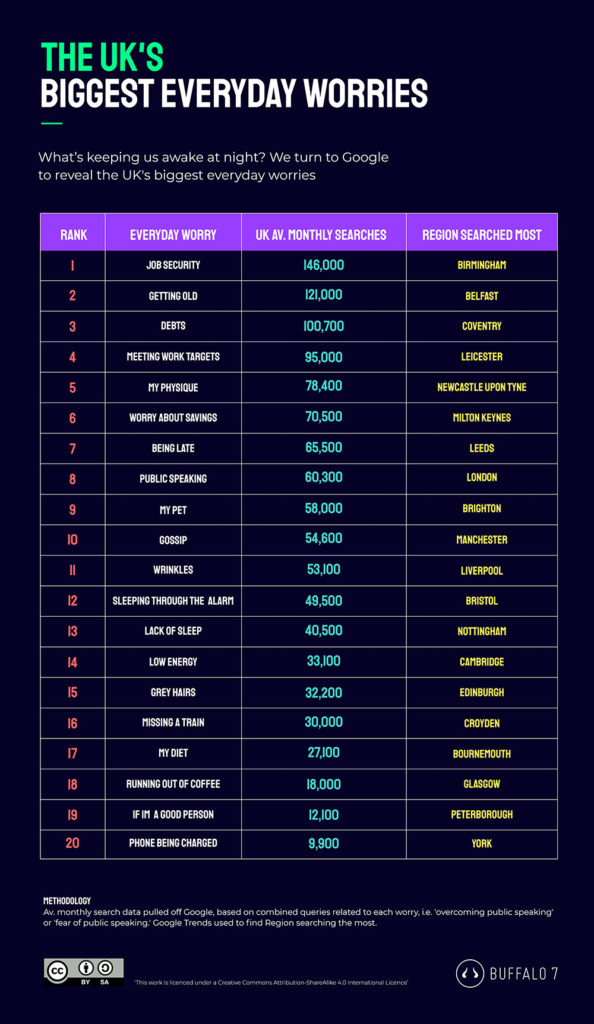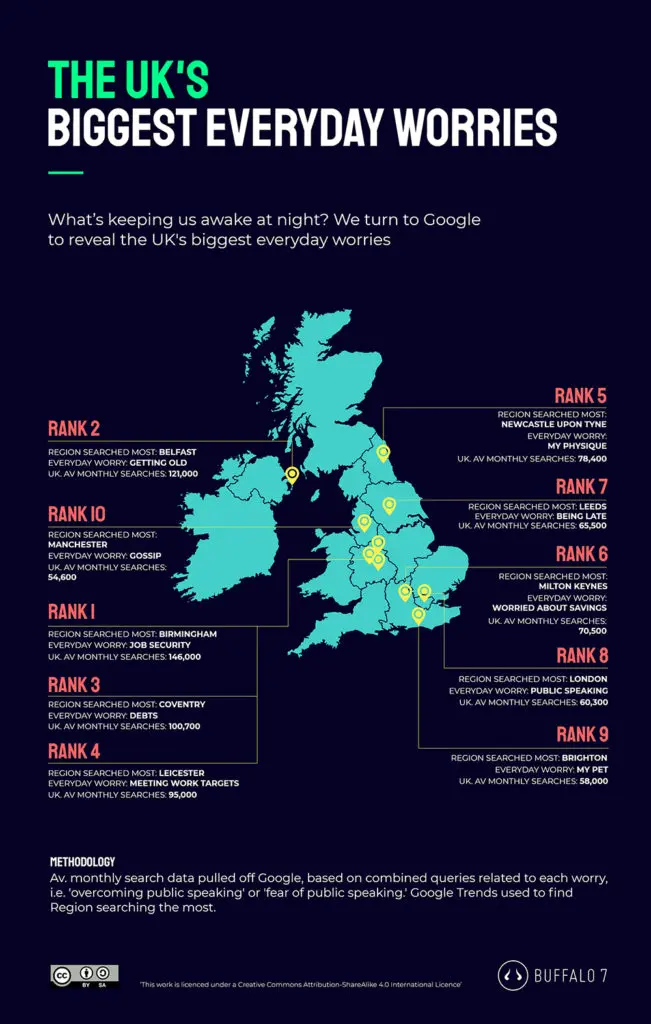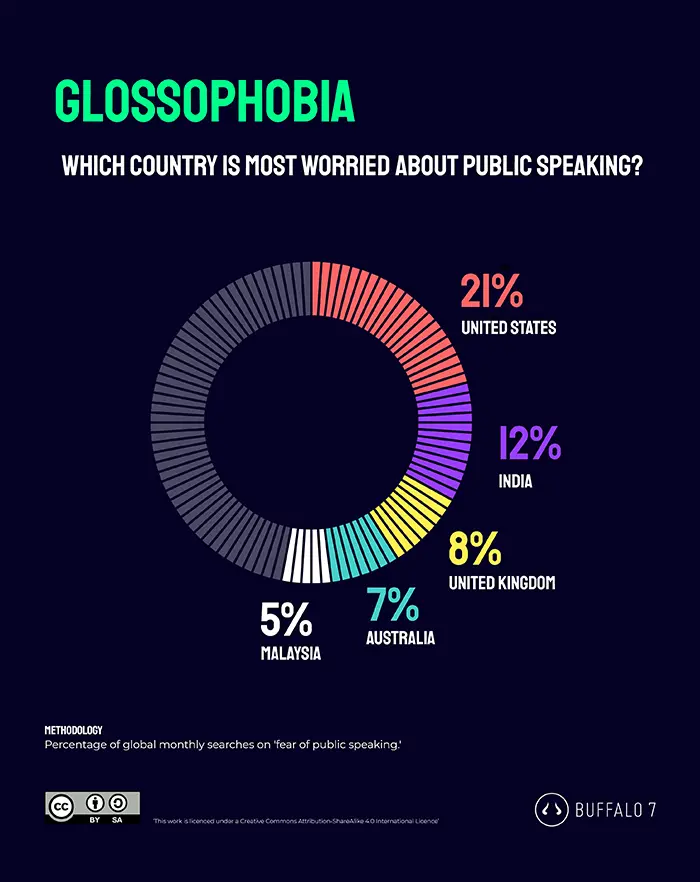Glossophobia, or speech anxiety, is the fear of public speaking, and it’s one of the most common everyday worries in the UK – affecting around 77% of Brits.
It’s an issue that will affect most of us at some point in our lives – whether speaking at a wedding, work event, or pitching to colleagues. Imagine standing up right now and reading this blog out loud to whoever’s in front of you. Do you feel dread in the pit of your stomach? Has your mouth suddenly gone dry and your hands clammy? Would you rather just run away into the woods and never come back? That’s glossophobia.
Of course, like all phobias, the fear you experience is totally unfounded; speaking out loud can’t hurt you. But that doesn’t stop it from feeling that way.
Life is full of phobias, and the worries that come with them, spoiling our days and leaving us sleepless at night.
Using Google search data, we’ve compiled a ranked list of the UK’s Biggest Everyday Worries, as well as what’s causing the biggest concern by region. Are we a nation of worriers?
The UK’s biggest everyday worries

Based on average Google monthly searches, it’s job security which takes the top spot with 146k average monthly combined searches on terms like ‘worry about job security’ or ‘concerned about job security.’ This makes sense following the Covid-19 crisis and its impact on the job market. Following this, getting old comes second with 121k searches on relevant search terms, and debts take the third spot with 100K.
Map of the UK’s most common everyday worries

Of all the major cities in the UK, Birmingham is the most worried about job security. Belfast about getting old, and Coventry for debts. London suffers the most from glossophobia, a fear of public speaking, whilst residents of Newcastle are concerned with their physique. Elsewhere, Manchester worries about gossip, Brighton is most concerned with their pets, and Leeds has issues with lateness.
We can’t help with most of these, or if you have a fear of clowns, moths, or porous surfaces, but here at Buffalo 7, we can help you to tackle your fear of glossophobia to become better public speakers.
Overcoming Glossophobia: Top tips for better public speaking

The fear of public speaking came eighth on our list of everyday worries, and compared with major concerns like debt and job security, it seems like nothing to worry about. But worry we do.
And with the recent news regarding a measured return to normality, subject to Covid-rates, many of us are going to have to face our fears of public speaking come summer, when we’re all back in the office, weddings are back on the agenda, and we’ll generally have a proper ‘public’ forum once again.
With that in mind, and to make sure you’re as confident as it can be when it comes to public speaking, we’ve included some quick tips to tackle glossophobia once and for all:
Get the tools you need
One way to feel more confident with public speaking is to have the right tools for the job. A great presentation with strong imagery, a clear narrative flow and simple, effective data visualisation can go a long way to making you look and feel like an expert.
It can give you the confidence you need to trust in yourself, knowing that your points are all supported clearly, beautifully, and with zero chance of going wrong.
Know your subject inside out
Knowing your subject completely is a great way to banish public speaking nerves. Fear often comes down to a lack of confidence – what if I get a tough question, what if someone in the audience thinks I’m talking nonsense?
Push past these thoughts. You’re talking. You’re the expert.
Speak from memory and don’t panic
Try speaking from memory as much as you can – use a few prepared cues to remind you of the key themes and perhaps any important facts and figures. This approach makes you seem more composed, natural and professional to your audience, and will really help to build your public speaking skills. If you lose your place, or forget where you are, don’t panic. Take a breath, refer to your notes and start again. Pauses are perfectly natural in the way we speak, and help to let each point sink in.
Speaker notes in software like PowerPoint can be a great help, but in the same way, avoid reading a script word-for-word. Instead, add a few bullet points to help you keep your place.
Know where to focus
Now, where to look? Scanning your eyes from left to right and back again works best for some people – every member of the audience feels as though you’re speaking directly to them, which really helps with engagement.
Some people find this hard, so try to pick out a few friendly faces amongst the crowd, or just focus on a spot on the back wall. If it helps to pretend that you’re just talking to one person, then it’s fine to do that, too.
Get into your rhythm
It can be tempting to just rattle through your talk as fast as you can to get it over and done with. But that’s not giving your audience a great experience, as your key points can get lost.
Take deep breaths, allow pauses between sentences, and take a longer pause between different themes. Some people find it useful to count to two between each sentence to keep a steady rhythm going.
And while you’re counting, don’t forget to smile! Putting a smile on your face can help to put your audience at ease, which helps them listen to what you’re saying.
Don’t be afraid to move
And that, in turn, helps you to relax and give a better speech. Don’t be afraid to move around, either.
Own that space: make use of your hands when presenting, walk around and change direction to add energy and passion to your words. Add some personality, and try to enjoy yourself: your audience will appreciate it and reciprocate the feeling.
Remember – being nervous is normal! But be entertaining
It’s OK to be nervous. Everyone is: some people can just hide it better than others. What’s important is how well you engage with your audience. The simple fact is that they want entertaining. No matter how interesting your subject, if you keep your head down and mumble through a full script word for word, they could end up getting bored.
Does your fear of public speaking extend to Zoom? If so, you might want to check out our study and tips on overcoming Zoom Anxiety.
Remember – nothing good can come from worry! If you’ve got concerns, whether they are at work or home, talk to family and friends and try not to be too hard on yourself. Practice that best man’s speech or client pitch and come out of this stronger than ever!
Methodology
Average monthly search data pulled from Google, based on combined queries relating to the worry – i.e ‘overcoming public speaking fear’ or ‘fear of public speaking’ ‘why am I afraid of public speaking’ ‘worry over public speaking.’ Google Trends was used to find which Region was searching for these terms the most.


